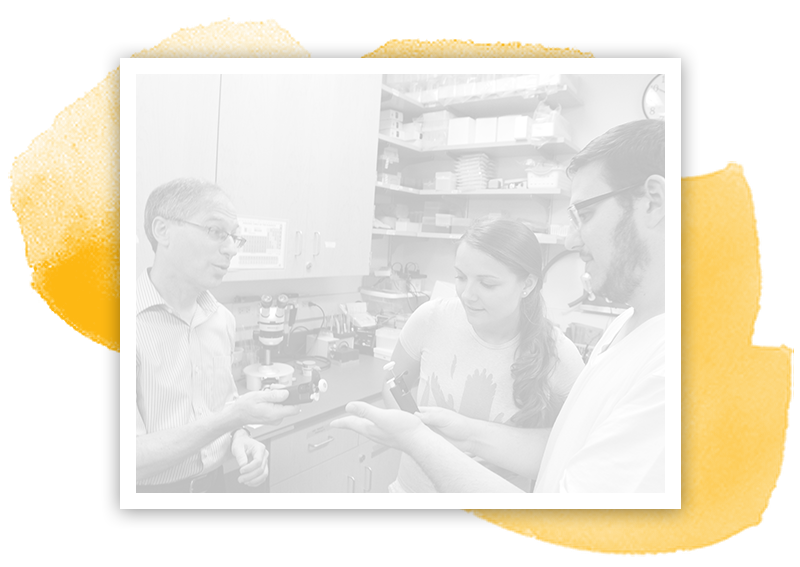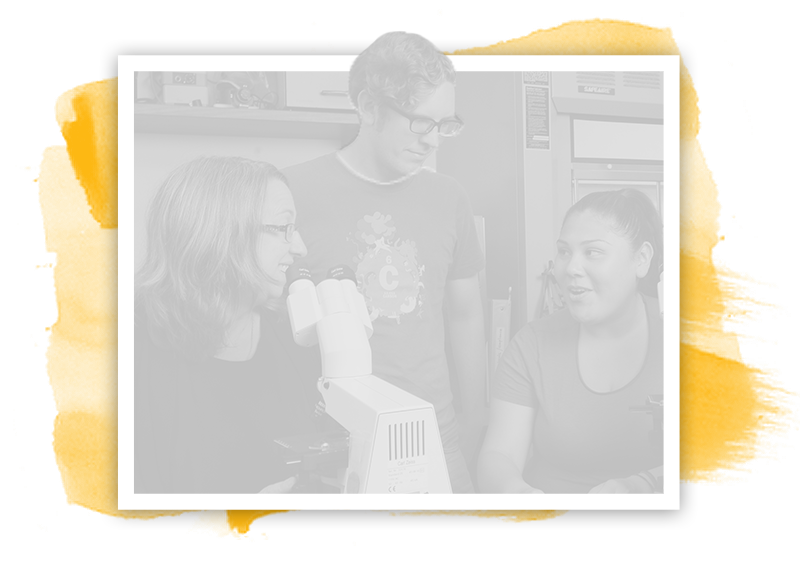Want to learn more about Northeastern?
We’ll email you a customized viewbook.
Some people don’t question their surroundings. They accept things and processes as they are without inquiring into the why or how behind them. That attitude has never defined you.
You’re mesmerized by the world—curious about its organisms and ecosystems. You attempt to conceptualize why all forms of life—from cells to animals and humans—behave and interact the way they do.
If you examine everything through a scientific perspective, Northeastern Illinois University’s Bachelor of Science in Biology degree resonates with your interests while providing a vibrant, broad-based foundation enhanced with an intensive laboratory curriculum designed to take you along a number of career paths.
Northeastern's Bachelor's in Biology prepares you for careers in medicine and healthcare, environmental restoration and conservation, lab and research settings, and much more. You'll observe and conduct experiments, and learn skills on data gathering, analysis and reporting.
Program at a Glance
Hands-on Lab Experience

Biology students practice relevant laboratory techniques in the program's intensive laboratory-based curriculum and engage directly with faculty in small classroom settings.

Faculty Research Initiatives

Students can pair with Biology faculty and take on research projects in a wide range of specializations, from cells to organisms to ecosystems.

Student Center for Science Engagement

A hub for students in STEM fields, the Center offers study groups, tutoring and individualized guidance on preparing for science-oriented careers.

Isaac Oguike, alum


Pamela Geddes, PhD, Associate Professor


Additional Resources
About the Bachelor’s in Biology Degree
We’re all surrounded by living organisms—even if we can’t always see them with the naked eye. The Department of Biology at NEIU encourages your internal drive to learn about the world around you. In nurturing your fascination, we supply you with the tools for exploration and guide you through a program strengthening your understanding of biological concepts and integrating them with other scientific fields.
Because you’ll take your knowledge and skills out into the world, continuing to inquire while devising solutions to real-life problems, the Department of Biology acknowledges that our students’ careers will take wildly divergent paths and will prepare you for the path you choose.
The program approaches biology from a comprehensive, holistic perspective, covering topics including botany, zoology, and microbiology within environmental, molecular, and medical areas. We strive to:
- impart detailed, complex knowledge of all biological processes and organization, from existence, genetics, and evolution through physical structures and chemical and molecular interactions;
- factor in the ecological context of biology, in terms of behavior and environmental conservation;
- strengthen your scientific thinking, both inside the laboratory and out in the world;
- provide you with the skills to analyze data from experiments and observation, helping you draw meaningful, effective conclusions and fostering your drive to discover and explore; and
- connect biology concepts to everyday life, be it growth, functioning, and development or the influence of natural selection and evolution.
Equipped with this knowledge, your future is open to multiple pathways:
- Continue your studies in a career-centric scientific graduate program: A Bachelor’s in Biology degree prepares you to pursue a Master’s or PhD in biology, biomedical science, ecology and applied ecology, botany, zoology, or veterinary sciences.
- Pursue professional training in medicine, nursing, dentistry, pharmacy, optometry, physical therapy, occupational therapy, or other health-related professions.
- Encourage other students’ interest in the natural world: With the Bachelor of Science in Biology, you can pursue the Master's degree in Secondary Education. You’ll enhance your scientific competencies with key teaching principles and strategies to pursue a career at the high school level.
- Make discoveries in a research- or technician-based role in the workforce: By connecting biology with other hard sciences, NEIU’s program equips you to seek solutions and solve problems in research, biomedical sciences, agriculture, industry, government, and academia.
If you’re ready to dedicate yourself to this rigorous program, you’re advised to declare your major as soon as possible and receive guidance from a departmental advisor. Please contact us at bioadvising@neiu.edu to make an advising appointment. We look forward to helping you!
Bachelor’s in Biology Curriculum
The hands-on component of studying biology makes laboratory work integral to the program, starting in the first few courses you take. You’ll conduct experiments, gather data for analysis and, in small classroom and laboratory settings, have the opportunity to engage with your professors or participate in research projects.
General Education Requirements
The General Education Program is designed to expand and invigorate your knowledge while supplying you with the critical thinking and communication skills essential for succeeding in the Bachelor’s in Biology program. This entails:
- Fine Arts—6 credit hours;
- Humanities—9 credit hours;
- Behavior and Social Sciences—9 credit hours;
- Math or Quantitative Reasoning—1 course; and
- Engaged Learning Experiences, which highlight the real-world applications of biology and where it overlaps with or connects to other fields.
As a note, students who have selected Biology as their major are exempt from the Natural Sciences component (9 credit hours) listed in the General Education Program’s requirements.
Biology Curriculum (68–71 Credit Hours)
Considering the subject area scope, the Department of Biology divides the bachelor’s program into the following segments:
Major and Electives (43–46 Credit Hours)
Structured to offer adaptable, comprehensive scientific training, this portion of the Biology degree program has a twofold purpose: to help you gain a firm understanding of the field’s principles and the scientific method and to prepare you for a career. You’ll:
- take six (6) core courses covering lab skills, data analysis, and research methods in general biology, cell biology, genetics, and ecology;
- complete five elective courses, with a wide array of subjects available to select based on your career and education objectives; and
- illustrate your knowledge and its application through cornerstone and capstone projects.
Cognate Courses (25 Credit Hours)
Cognate courses give you the scientific and mathematical foundation essential for absorbing new concepts, engaging in experiments, and improving your outcome here and in the workplace. Integrated throughout the rest of the Biology curriculum, cognate courses enhance and shepherd your interest through subjects in chemistry, physics, and mathematics.
Review the full curriculum, all requirements, and course descriptions for the BS in Biology degree.
What Can You Do With a Bachelor’s Degree in Biology?
When you yearn to make an impact on the world, whether through scientific discovery, medical advances or encouraging curiosity and investigation in others, a Bachelor’s degree in Biology creates a versatile platform for launching a number of careers. Your knowledge and skills prove to be an asset in:
- medicine and healthcare;
- environmental conservation;
- zoology;
- bioinformatics;
- laboratory and research settings;
- veterinary medicine;
- biotechnology and pharmaceuticals; and
- government organizations, including the National Institutes of Health (NIH), Occupational Safety and Health Administration (OSHA), Environmental Protection Agency (EPA), and the US Department of Agriculture (USDA).
Based on your interest and whether you earn a graduate degree in the future, opportunities for high school teachers, including in the sciences, are predicted to increase 4% between 2019 and 2029, according to figures from the Bureau of Labor Statistics (BLS). Related to biology’s various applications, the BLS further estimates greater demand for zoologists and wildlife biologists (4%), biological technicians (5%), conservation scientists and foresters (5%), environmental scientists (8%), and genetic counselors (21%)
Admission Requirements
Find yourself challenged by research and laboratory work and the process of scientific discovery in a diverse, welcoming environment where you can flourish. NEIU encourages you to consider the Bachelor’s in Biology program to continue pursuing what engages and interests you.
To apply, candidates must fulfill all requirements for freshman or transfer students.
Nourish Your Curiosity in NEIU’s Bachelor’s in Biology Degree Program
If you dream about understanding the natural world and the human body even further, craft your future toward your strengths and what intrigues you in NEIU’s Bachelor of Science in Biology degree program. If you have any questions, please contact the Department of Biology at bioadvising@neiu.edu.










